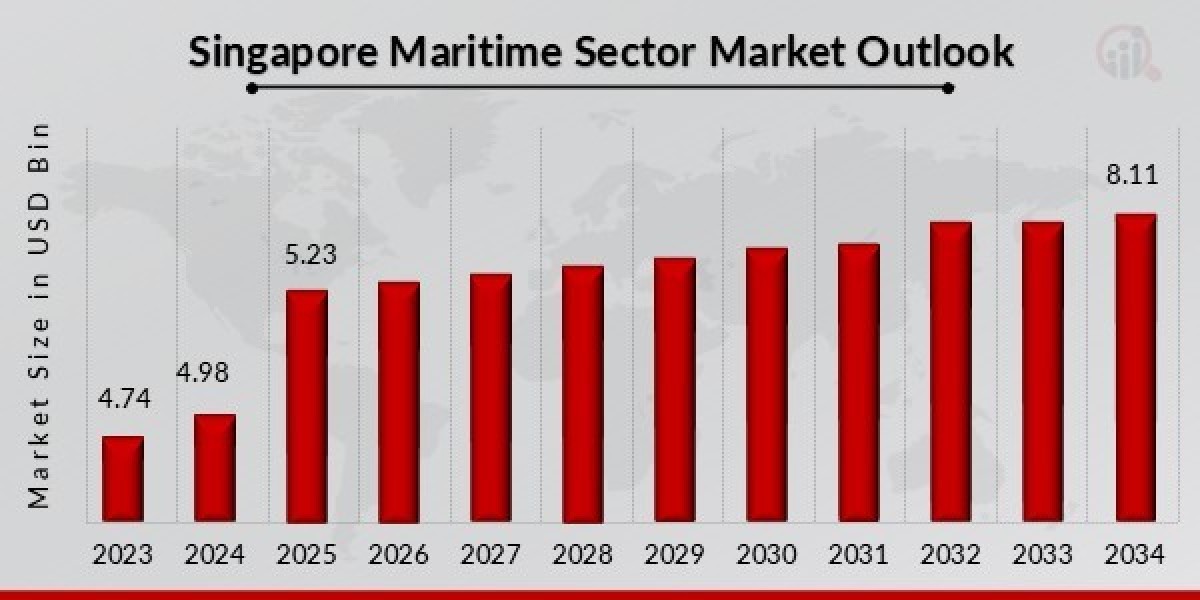Singapore Maritime Sector Market Growth, Trends, and Future Outlook
Singapore has long been a global maritime hub, strategically positioned at the crossroads of major shipping routes. The country’s maritime sector plays a crucial role in international trade and logistics, supported by world-class infrastructure, a robust regulatory framework, and a commitment to technological advancements. In 2024, the Singapore Maritime Sector Market was valued at USD 4.98 billion and is expected to grow steadily, reaching USD 8.11 billion by 2034, with a CAGR of 5.00% during the forecast period (2025–2034). This growth trajectory underscores the increasing significance of Singapore as a pivotal maritime hub in Asia and beyond.
Key Market Drivers
Several factors contribute to the continued expansion of the Singapore maritime sector, making it a critical component of the country’s economy:
1. Strategic Location and Connectivity
Singapore’s geographical advantage as a key node along the world’s busiest shipping lanes ensures its prominence in the maritime industry. The nation’s deep-sea ports serve as a gateway for global trade, facilitating seamless connectivity between Europe, the Middle East, and Asia-Pacific regions. This strategic positioning attracts major shipping companies, reinforcing Singapore’s status as a transshipment and logistics hub.
2. Advanced Infrastructure and Port Facilities
Singapore’s maritime sector benefits from state-of-the-art infrastructure, including world-class container terminals, automated port operations, and cutting-edge logistics solutions. The development of Tuas Port, set to become the world’s largest fully automated terminal by 2040, exemplifies Singapore’s commitment to enhancing port efficiency, sustainability, and scalability. These investments ensure the sector remains competitive in the face of rising global trade demands.
3. Technological Advancements and Digitalization
Singapore has embraced digital transformation in its maritime operations. Innovations such as blockchain-based shipping processes, AI-driven logistics management, and autonomous vessel technology are being implemented to enhance efficiency and reduce costs. The Maritime and Port Authority of Singapore (MPA) has been instrumental in fostering collaborations between tech firms and maritime enterprises to drive digitalization across the industry.
4. Sustainable and Green Initiatives
With the global focus shifting towards sustainability, Singapore’s maritime sector is prioritizing green shipping initiatives. Investments in cleaner fuel alternatives, energy-efficient port operations, and the adoption of International Maritime Organization (IMO) regulations on emissions reduction have positioned Singapore as a leader in sustainable maritime practices. The Green Ship Programme and the Green Port Programme aim to support shipping companies in adopting eco-friendly operations.
Market Trends and Opportunities
The growth of Singapore’s maritime sector is shaped by several emerging trends that present lucrative opportunities for businesses and stakeholders:
1. Expansion of Smart Ports
The integration of AI, IoT, and big data analytics is revolutionizing port management. Smart ports in Singapore leverage real-time data analytics to optimize cargo handling, streamline logistics, and minimize turnaround times for vessels. These innovations enhance operational efficiency and boost the country’s appeal as a global shipping hub.
2. Growth in Maritime FinTech
The adoption of financial technology (FinTech) solutions within the maritime industry is gaining momentum. Digital payment systems, smart contracts, and blockchain-based trade finance platforms are enhancing transparency, reducing transaction costs, and mitigating risks associated with cross-border trade. Singapore’s robust FinTech ecosystem provides a strong foundation for maritime financial services.
3. Increased Investment in Maritime Cybersecurity
As digitalization accelerates, cybersecurity has become a priority for maritime enterprises. The sector is increasingly investing in advanced cybersecurity measures to protect critical shipping data, prevent cyber threats, and ensure the safety of digital maritime operations. This growing need presents opportunities for cybersecurity firms to collaborate with maritime stakeholders in developing robust security frameworks.
4. Rise of Offshore and Marine Engineering Services
Singapore’s expertise in offshore and marine engineering is attracting global investments. With rising demand for offshore energy solutions, shipbuilding, and marine equipment manufacturing, Singapore-based companies are expanding their capabilities to cater to the evolving needs of the industry. The nation’s focus on innovation in offshore technology further strengthens its position in this segment.
Competitive Landscape
The Singapore Maritime Sector Market companies is highly competitive, with key players investing in technological advancements, strategic partnerships, and infrastructure development to maintain their market positions. Leading players include:
- PSA International Pte Ltd
- Keppel Offshore & Marine Ltd
- Sembcorp Marine Ltd
- Jurong Port Pte Ltd
- Pacific International Lines (PIL)
Outlook
Looking ahead, the Singapore maritime sector is poised for sustained growth, driven by technological advancements, digitalization, and environmental sustainability initiatives. The government’s proactive policies, coupled with industry-wide collaborations, will continue to strengthen Singapore’s position as a global maritime powerhouse.
With a projected market value of USD 8.11 billion by 2034, businesses and investors have significant opportunities to capitalize on the evolving trends and expand their presence in Singapore’s maritime sector. As the industry navigates challenges such as regulatory changes, geopolitical uncertainties, and environmental concerns, Singapore remains resilient, leveraging innovation and strategic investments to stay ahead in the global maritime landscape.
Conclusion
The Singapore Maritime Sector Market presents promising growth prospects, fueled by strategic location advantages, advanced port facilities, and a strong commitment to digitalization and sustainability. As global trade volumes increase, Singapore’s maritime industry is well-positioned to cater to the rising demand for efficient and eco-friendly shipping solutions. Businesses and stakeholders in the maritime ecosystem should leverage these opportunities to drive innovation, enhance operational efficiency, and contribute to the long-term success of the industry.
About US
Market Research Future (MRFR) is a global market research company that takes pride in its services, offering a complete and accurate analysis about diverse markets and consumers worldwide. Market Research Future has the distinguished objective of providing the optimal quality research and granular research to clients. Our market research studies by products, services, technologies, applications, end users, and market players for global, regional, and country level market segments, enable our clients to see more, know more, and do more, which help answer your most important questions.
Contact US
Market Research Future (part of Wants tats Research and Media Private Limited),
99 Hudson Street,5Th Floor New York 10013, United States of America
Sales: +1 628 258 0071 (US) +44 2035 002 764 (UK)
Email: Sales@marketresearchfuture.com



